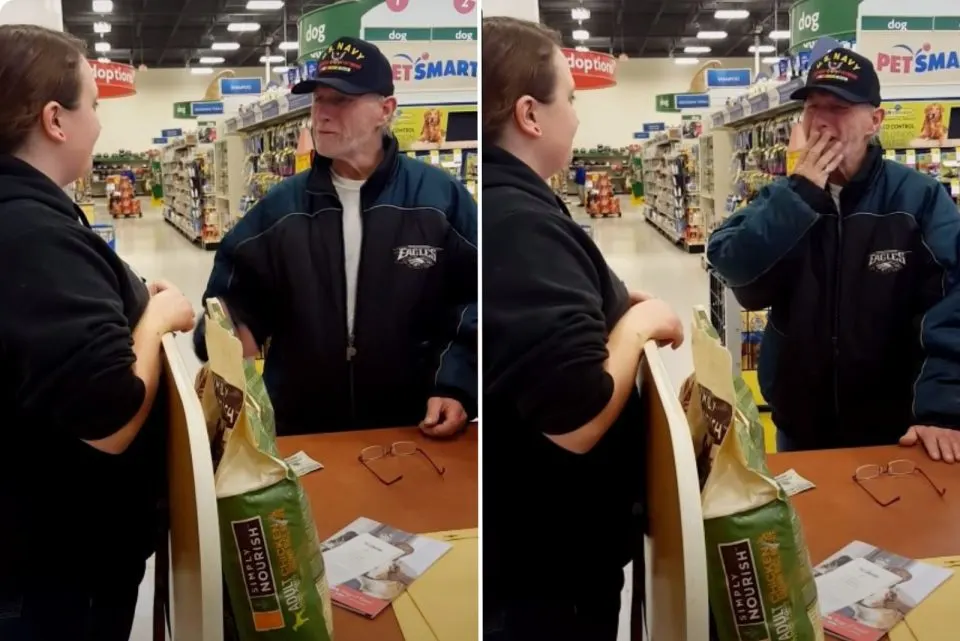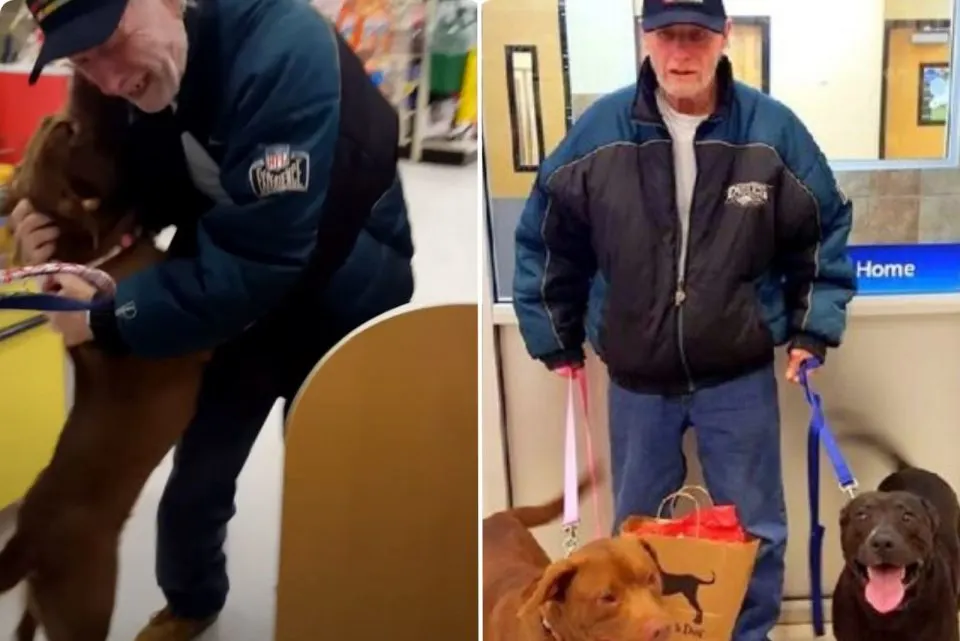They serve. They gamble their life to keep us safe. They have courage like no one else.
But, when they’re done with their service, they often end up marginalized.
Veterans don’t get the treatment they deserve.
Veterans are not appreciated the way they should be.
When one of those brave people ended up with only a few bucks in his pocket, fortune did a cruel trick on him: he lost his best friends… his canine buddies.
But, James Pack, a Vietnam veteran, wasn’t alone in this world. With a little help from good people, James and his pups were reunited in the most tear-jerking way.
Reunited, Thanks To Good People

James Pack, a Vietnam veteran, was hospitalized in critical condition after suffering a heart attack.
Pack spent a lot of time in the hospital recovering from this life-threatening mishap that struck him. During this time, he had to say goodbye to his two dogs, Bailey and Blaze.
Since Pack lived alone, no one was able to take care of the dogs. The local First State Animal Center and SPCA, in Newark, Delaware, took the dogs in until Pack recovered.
Unfortunately, according to the Center’s policy, the recovery took too long and they couldn’t keep the dogs anymore. Bailey and Blaze had to be put up for adoption. And, as the rules say, an adoption fee must be paid in order to get the dogs.
Everyone has to pay, including Pack, despite the fact that those were his dogs.
Pack was desperate. His hospital bill was already too high and he barely covered it.
The only thing he could do to gather the money to adopt his dogs was to sell his car.
Pack didn’t really have much, and the $250 for adoption meant the world to him. That money was the ticket to get back his beloved friends.
When the good people at PetSmart, a store where the shelter is located, heard of James’ story, they immediately decided to chip in and help. Little by little, everyone contributed, giving $5, $10, $15, just to help raise the adoption fee.
It didn’t take long for the fee to be gathered.
But, James didn’t know a thing.
When he came into PetSmart to see his dogs and get the paperwork started to get his dogs, there was a surprise waiting for him. The employers welcomed James, giving him the funds they’d gathered, and then everyone started shedding tears.
The manager of the Center reduced Pack’s fee in half. Volunteers pitched in… one of them even paid for the entire adoption fee, while the rest of the money was used to get things James and his dogs would need.
James couldn’t believe what the volunteers were saying. He was shaken to the core, unable to speak or react in any other way than crying and gasping for air.

After three long months, James was finally reunited with his dogs. They mean the world to him. They’re the only living beings that care about James.
It’s safe to say that James’ heart was now fully healed.
If you’ve ever wondered why your furry friend can’t snack on grapes, you’re not alone. As a seasoned dog trainer, it’s crucial to understand the potential dangers lurking in everyday foods. The mystery behind why grapes are off-limits for dogs might surprise you. Dogs’ unique biology can lead to unexpected reactions to certain foods, making it essential to be mindful of what you feed them. Let’s unravel the reasons behind this common cautionary tale in the world of pet care.
The Dangers of Grapes to Dogs
What Makes Grapes Toxic to Dogs?
Grapes, though delicious for humans, can be toxic to dogs. The exact reason why grapes are harmful to dogs is still unknown. Even small amounts can lead to severe health issues, including kidney failure. Both seeded and seedless varieties of grapes can be dangerous.
Recognizing Symptoms of Grape Poisoning
It’s crucial to be able to recognize the signs of grape poisoning in dogs. Symptoms may include vomiting, diarrhea, lethargy, and dehydration. In more severe cases, dogs may experience a sudden lack of appetite, abdominal pain, and tremors. Immediate veterinary care is essential if you suspect your dog has ingested grapes.
Understanding Canine Biology
How Dogs Process Foods Differently Than Humans
Dogs have a unique digestive system that processes foods differently than humans. While we can enjoy a variety of fruits without issue, dogs can be sensitive to certain foods like grapes. Grapes contain compounds that can be toxic to dogs, leading to severe health problems. It’s essential to recognize this difference in digestion between dogs and humans to avoid inadvertently causing harm to our furry friends.
The Role of Metabolism in Toxicity
Metabolism plays a crucial role in how dogs react to foods like grapes. When dogs consume grapes, their bodies metabolize the toxic substances differently than humans. This different metabolism process can result in adverse reactions, such as kidney damage and failure. Understanding how metabolism functions in dogs when they ingest certain foods is vital in comprehending why grapes are particularly harmful to them.
Remember, being aware of these biological differences in how dogs process foods can prevent potential health issues and ensure the well-being of your canine companion. If you suspect your dog has ingested grapes or shows any symptoms of toxicity, seek immediate veterinary care to prevent serious complications.
Case Studies and Veterinary Reports
Documented Incidents of Grape Toxicity
In real-life cases, dogs consuming grapes have suffered from severe health issues like kidney failure. These incidents show the detrimental effects of grapes on dogs’ bodies. Such documented cases highlight the urgency of keeping grapes out of reach of your furry companion to prevent potential harm.
The Scientific Community’s Perspective
Veterinary reports confirm the toxicity of grapes to dogs, emphasizing the importance of immediate action if ingestion occurs. Scientists stress that the substances in grapes can lead to kidney damage in dogs, underscoring the need for vigilance in avoiding grape consumption by your pet. Trusting the scientific consensus can guide you in protecting your dog’s well-being and ensuring a safe environment free from grape-related risks.
Alternatives to Grapes for Your Dog
Safe and Healthy Treat Options
When looking for safe alternatives to grapes, consider various fruits that are known to be dog-friendly and offer nutritional benefits. Opt for fruits like apples, bananas, and blueberries, which are generally well-received by dogs and provide essential vitamins and minerals. These fruits can be great options for treating your dog without the risks associated with grapes. Remember to remove any seeds or pits before offering them to your furry friend to prevent choking hazards.
How to Choose Dog-Friendly Fruits
Choosing dog-friendly fruits requires understanding which fruits are safe and beneficial for your canine companion. Prioritize fruits that are non-toxic to dogs, such as watermelon (without seeds), strawberries, and pineapples. These fruits offer a sweet and refreshing snack while being safe for your dog’s digestion. Avoid fruits like grapes, raisins, and cherries, which can be harmful to dogs. By selecting the right fruits for your dog, you can provide them with a tasty and healthy treat that contributes to their overall well-being.
Preventing Accidental Ingestion
Tips for Keeping Grapes out of Reach
To safeguard your furry friend, ensure grapes are stored securely in closed cabinets or high shelves where they can’t reach them. Keep countertops clear of any grape-related items, including dishes, snacks, and decorations. Additionally, when outdoors, be vigilant at picnics or gatherings where grapes may be present, making sure your dog doesn’t accidentally get hold of any.
What to Do If Your Dog Eats Grapes
If you suspect your dog has consumed grapes, act promptly. Contact your vet or an emergency animal clinic immediately, providing details such as the quantity ingested and your dog’s weight. Follow their advice closely, which may include inducing vomiting if caught early. Be prepared to visit the vet for further evaluation and treatment to prevent grape toxicity from causing harm to your beloved pet.
Conclusion
Now you know why dogs can’t eat grapes. It’s crucial to keep these fruits away from your furry friends to avoid any risks of grape poisoning. Remember, quick action is key if your dog accidentally eats grapes – contact your vet immediately. Stay vigilant at gatherings where grapes might be around, and opt for safe fruit alternatives for your pup’s snacks. Your dog’s health and well-being come first, so be proactive in protecting them from the dangers of grape ingestion.
Frequently Asked Questions
Can dogs eat grapes?
No, dogs should not eat grapes. Grapes can be toxic to dogs and may lead to serious health issues such as kidney failure.
What are the symptoms of grape poisoning in dogs?
Symptoms of grape poisoning in dogs include vomiting, diarrhea, lethargy, decreased appetite, abdominal pain, and increased thirst and urination.
What should I do if my dog eats grapes?
If your dog consumes grapes, contact your vet or an emergency clinic immediately. Share details of the ingestion and follow professional advice, which may involve inducing vomiting and seeking further evaluation and treatment.
How can I prevent my dog from eating grapes?
Prevent accidental grape ingestion by keeping grapes out of reach in secure storage areas and being cautious at gatherings or events where grapes may be present.
Are there safe fruit alternatives for dogs?
Yes, safe fruit alternatives for dogs include apples, bananas, blueberries, and strawberries. Always ensure that any fruits given to your dog are safe and suitable for their consumption.
[no_toc]

Hey there, I’m Janet Brooks, a dog-loving student from California. I’m all about helping pups in need, especially those without homes. Me and my awesome friends work together to give shelter and love to stray dogs. Oh, and I also write blogs about dogs to share helpful info.